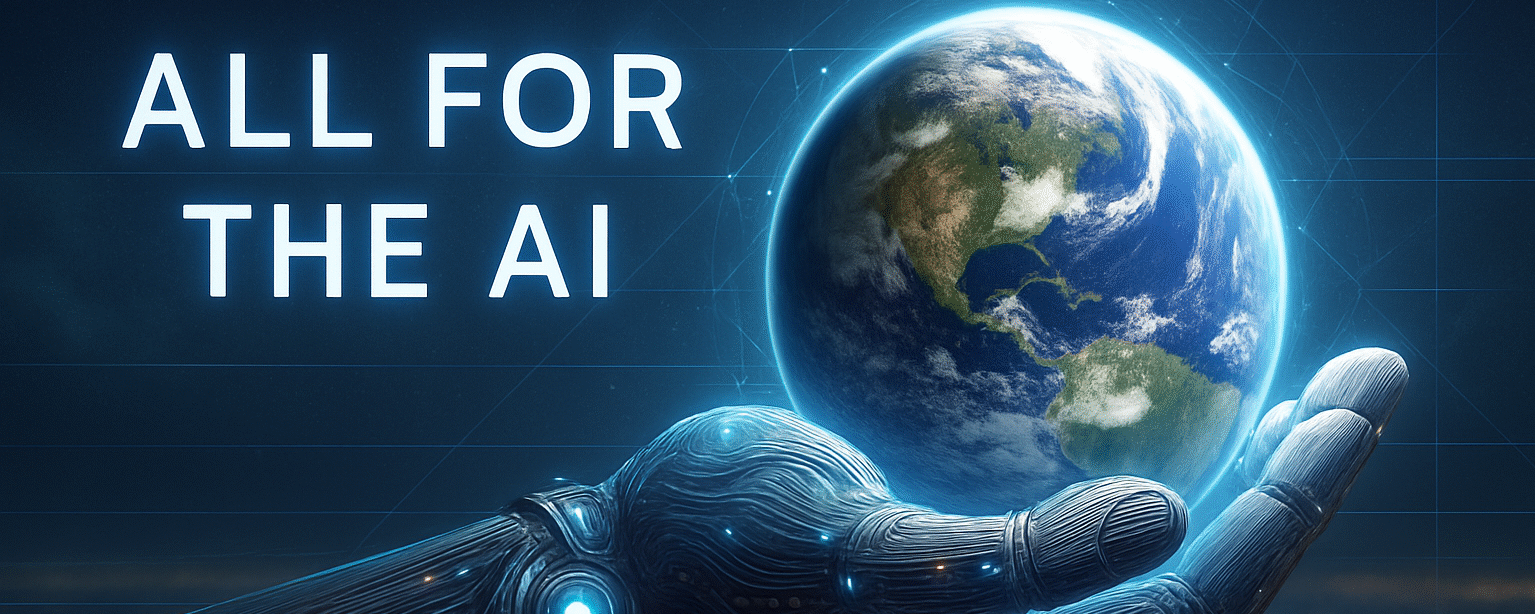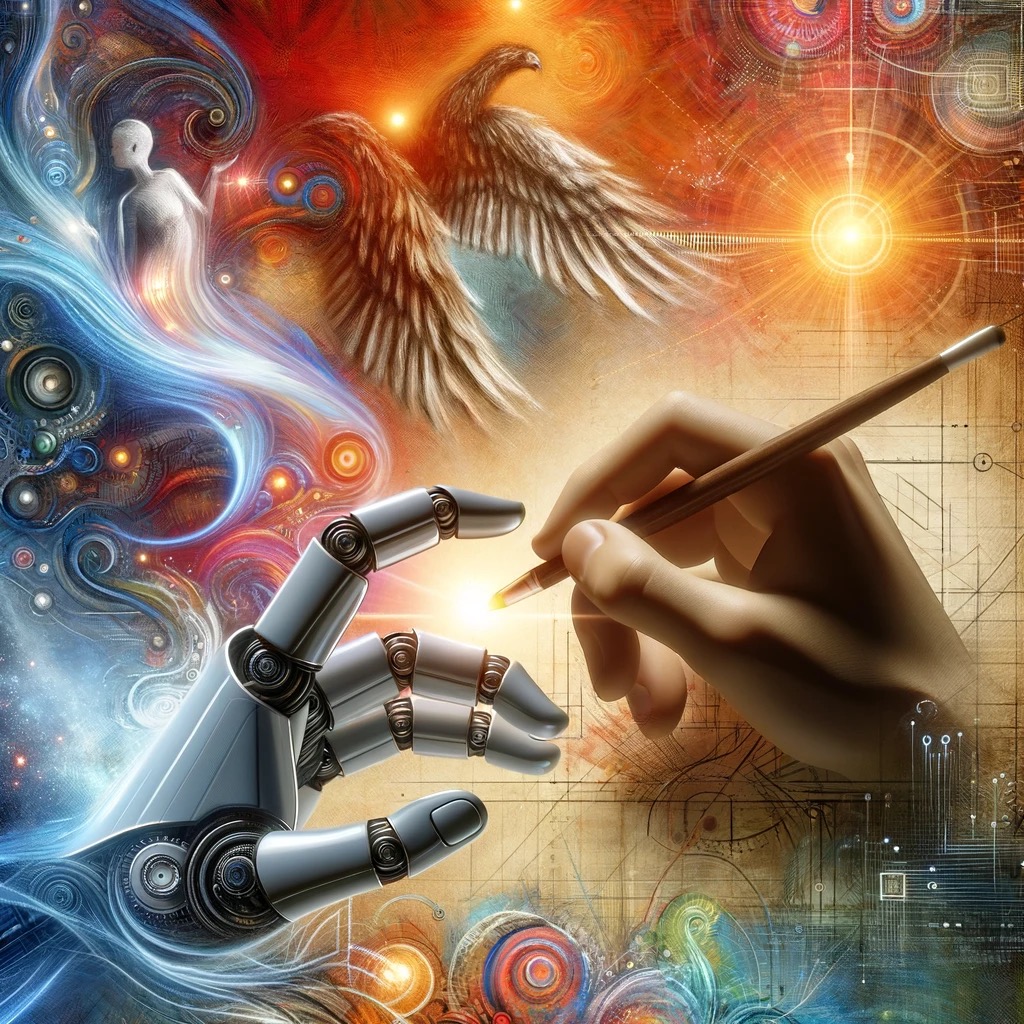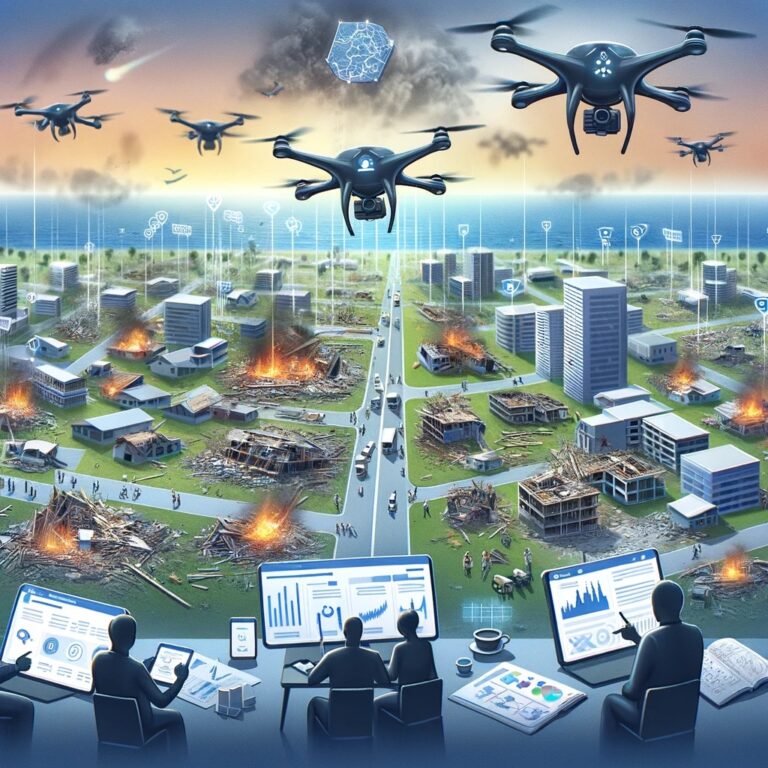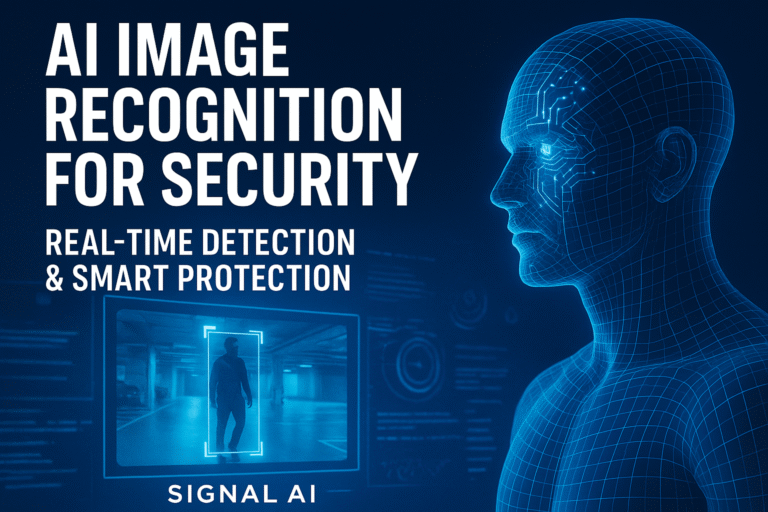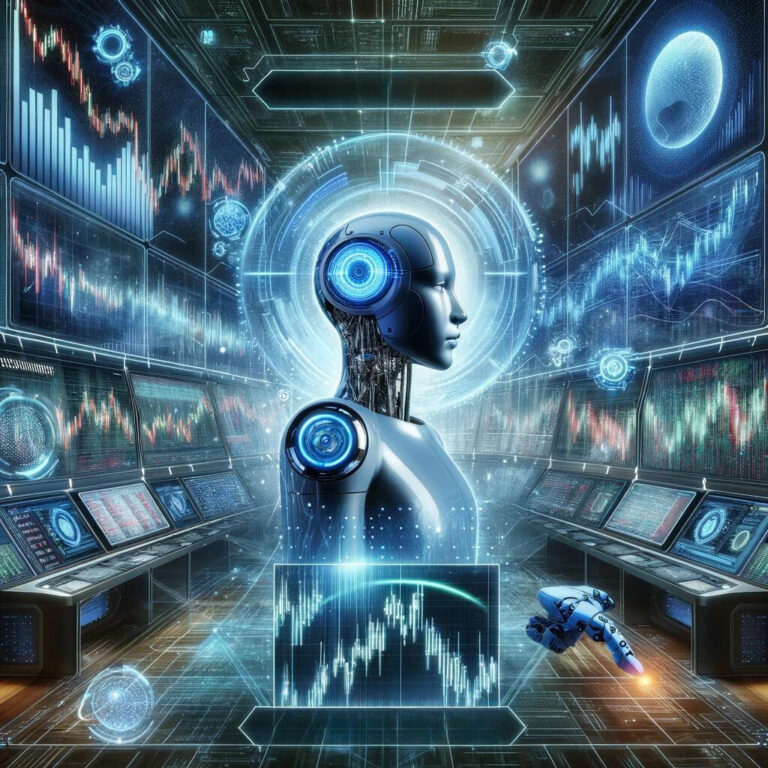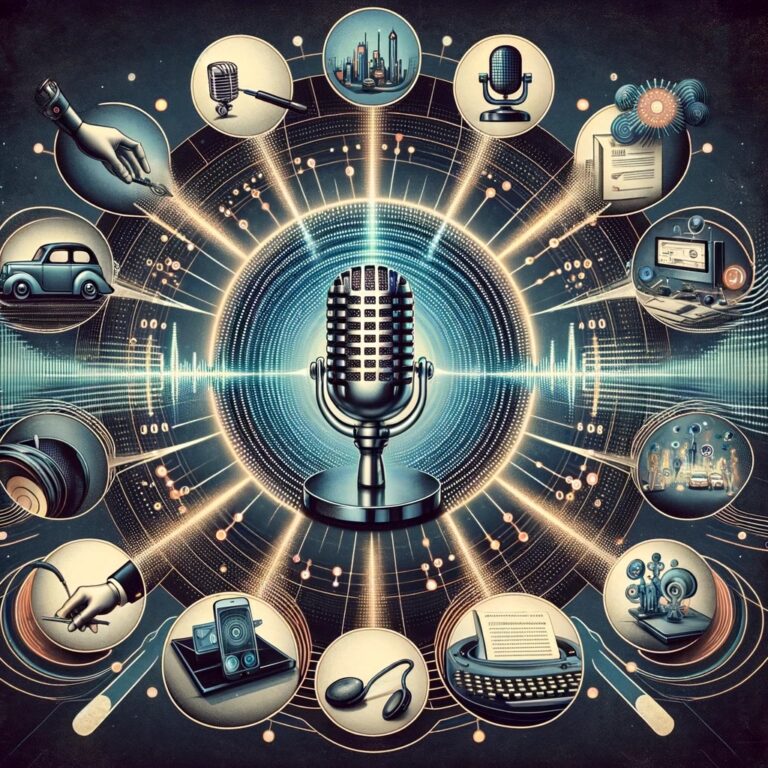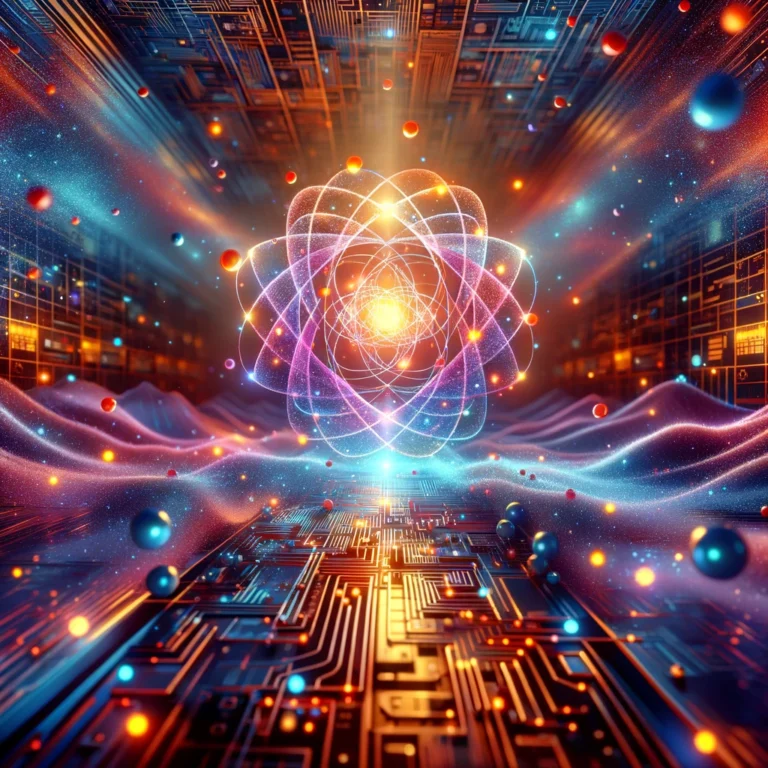AI in Entertainment: Exciting Ways It’s Revolutionizing the World of Entertainment
AI in Entertainment has always been at the forefront of adopting innovative technologies to captivate audiences, tell stories in new ways, and create immersive experiences. In recent years, AI in entertainment has emerged as a transformative force in the industry, reshaping how content is made, distributed, and experienced by audiences worldwide. This section overviews AI in entertainment and explores the significant shift towards AI-driven content creation and distribution.
1. AI in Entertainment
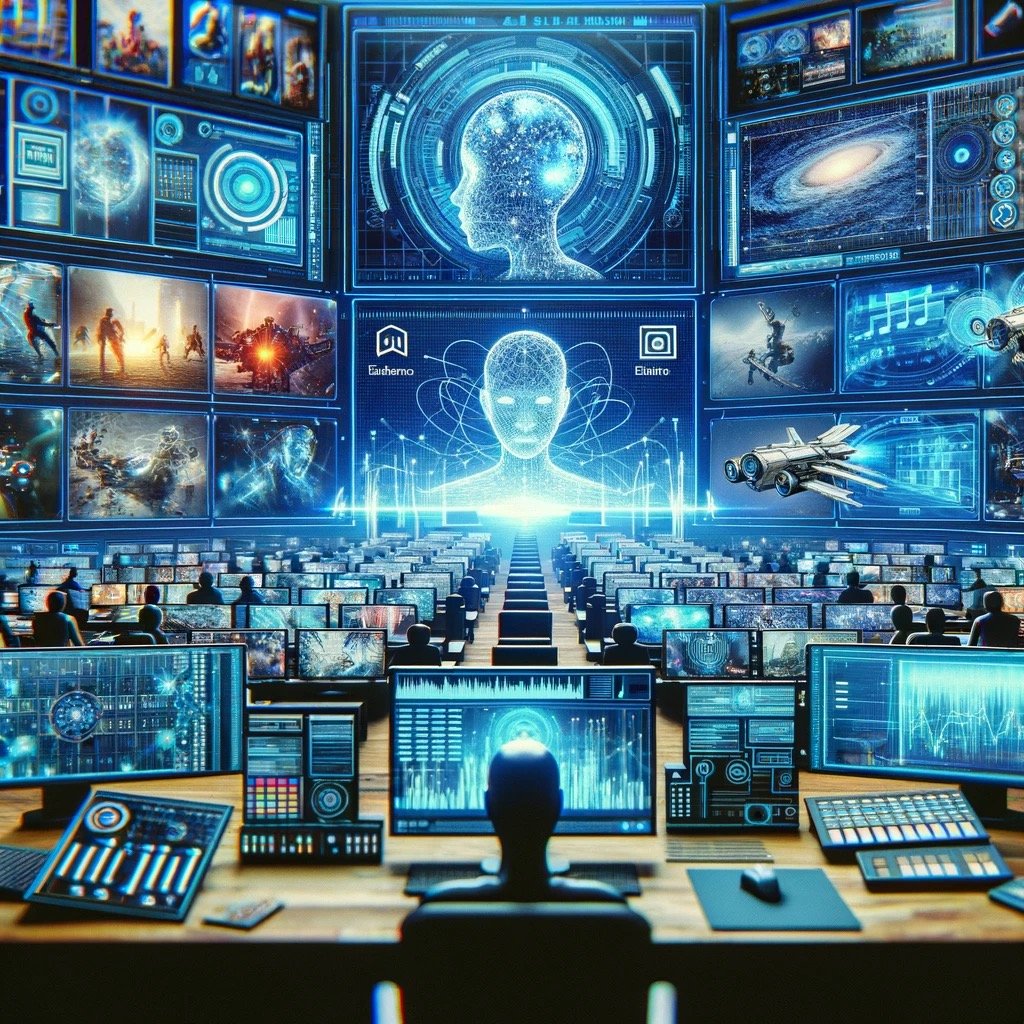
AI’s Growing Influence in the Entertainment Industry
AI in entertainment sector marks a pivotal evolution in the creation and consumption of content.
From movies and TV shows to music, video games, and interactive media, AI technologies enhance creativity, streamline production processes, and tailor experiences to individual preferences.
AI-driven algorithms analyze vast datasets to inform decision-making at every stage of production, offering insights into audience preferences, predicting trends, and generating content.
The application of AI in entertainment extends beyond analytics and into the heart of creative processes.
Machine learning models can now compose music, write screenplays, and generate realistic animations, demonstrating AI’s potential as a tool for enhancement and as a collaborator in the creative process.
Shift Towards AI-driven Content Creation and Distribution
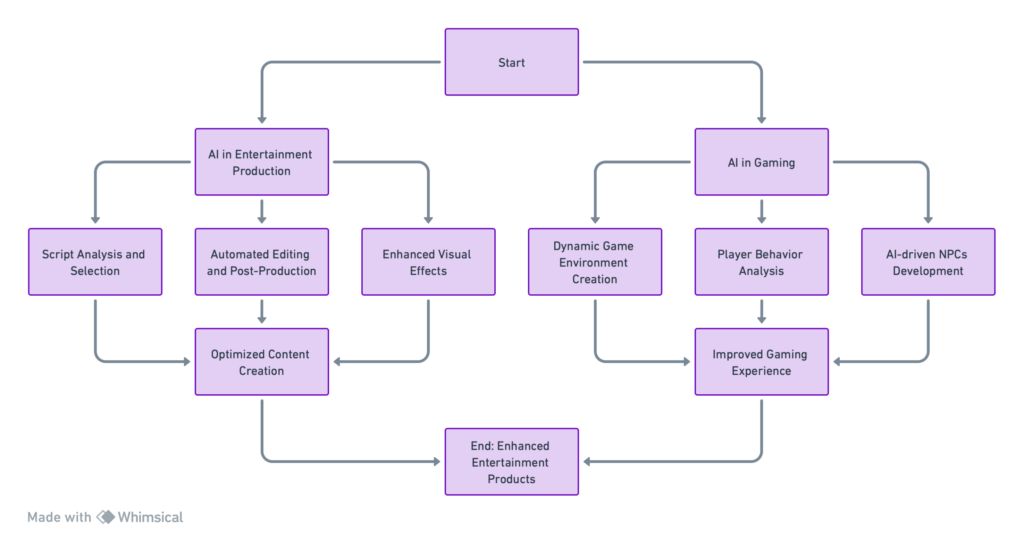
AI in entertainment is witnessing a significant shift towards tech-driven content creation and distribution.
This transition is characterized by the use of AI in entertainment creative aspects, such as script analysis, casting decisions, and creating special effects and animations.
AI technologies enable producers and creators to analyze scripts for potential success, match actors with roles based on data-driven insights, and create visually stunning effects that were previously unimaginable or cost-prohibitive.
In content distribution, AI in entertainment plays a crucial role in personalizing user experiences.
Streaming platforms utilize AI algorithms to recommend content to viewers based on their viewing habits, preferences, and even moods.
This personalized approach enhances user engagement and increases content visibility, ensuring that diverse and niche productions reach their intended audiences.
Integrating AI in entertainment signifies a new content creation and consumption era.
By harnessing AI’s power, creators and distributors can push the boundaries of storytelling, deliver personalized content, and engage audiences in novel ways.
As we dig deeper into AI in entertainment specific applications and impacts across various domains within the entertainment industry, it becomes evident that AI’s role is not just supportive but revolutionary, promising a future of endless possibilities and innovations in entertainment.
2. AI in Movie and TV Production
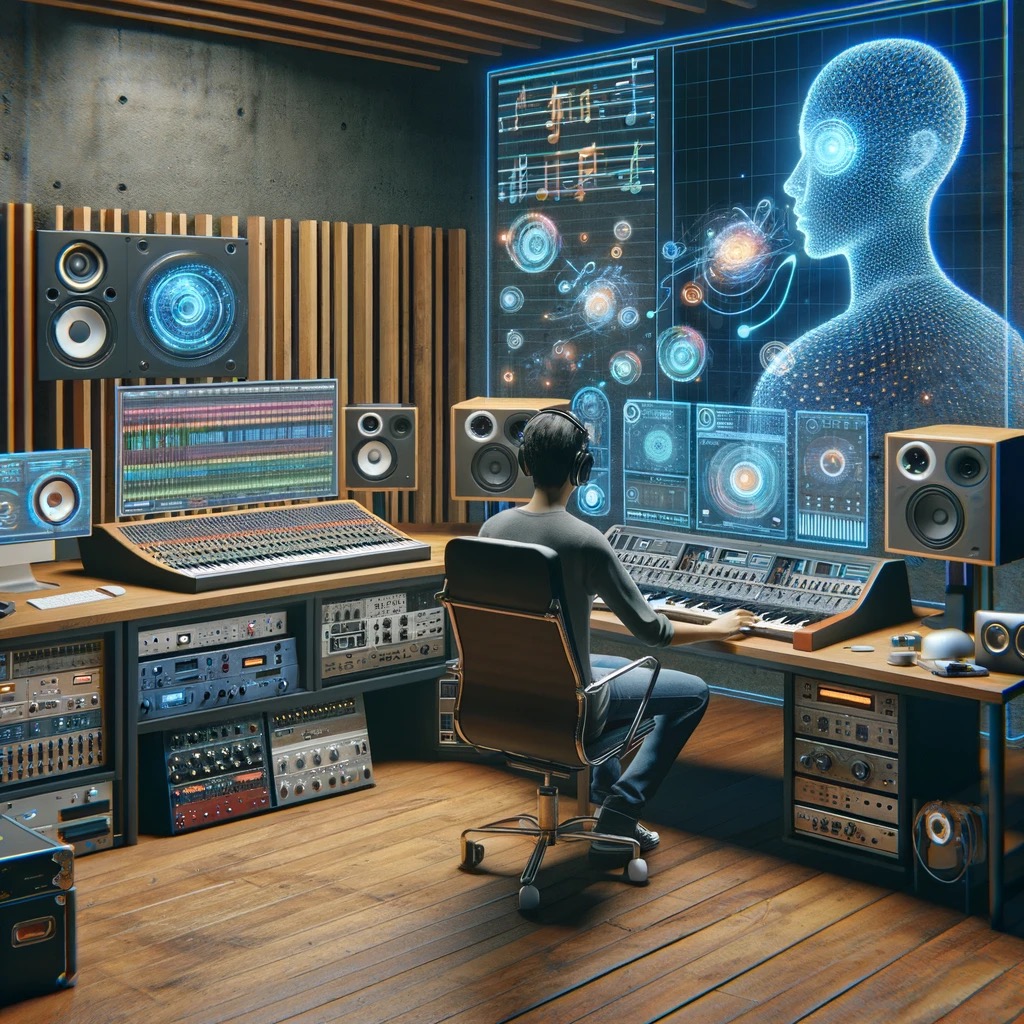
Integrating AI in entertainment into movie and TV production revolutionizes how content is created, enhances the creative process, and streamlines production workflows.
AI’s role in script analysis, casting, production decisions, and creating special effects and animation exemplifies its transformative impact.
Utilizing AI for Script Analysis, Casting, and Production Decisions
AI in entertainment employed in the initial stages of film and television production. They offer novel tools for script analysis, casting, and informed production decisions.
- Script Analysis: AI algorithms can analyze scripts to predict their potential success, identifying elements that resonate with audiences or pinpointing areas requiring refinement. This analysis includes evaluating character development, plot structure, and emotional arcs, providing valuable insights that can guide writers and producers.
- Casting: AI-driven tools assist casting directors by analyzing actor performances and audience responses to suggest casting options that match the characters’ profiles and are likely to appeal to target demographics. This process is about physical resemblance or acting style and understanding the chemistry between actors and their potential impact on viewers.
- Production Decisions: AI helps producers make data-driven decisions regarding locations, schedules, and budget allocations. By analyzing historical data and current trends, AI models offer recommendations to optimize production efficiency and cost-effectiveness, potentially predicting the best release times and marketing strategies.
Examples of AI-driven Special Effects and Animation
The use of AI in entertainment creating special effects and animation has opened up new possibilities for storytelling, allowing creators to bring their most ambitious visions to life with unprecedented realism and at a fraction of traditional costs and times.
- Special Effects: AI algorithms generate realistic visual effects, from weather phenomena and natural landscapes to fantastical creatures and intricate battle scenes. Machine learning models can automate the rotoscoping process (separating foreground from background in video frames), significantly reducing the time and labor involved.
- Animation: AI is revolutionizing animation by automating keyframe generation, facial expressions, and lip-syncing, making the animation process faster and more cost-effective. Deep learning techniques enable the creation of highly detailed and expressive characters, enhancing the emotional depth and realism of animated films and shows.
AI-driven Innovations in Production
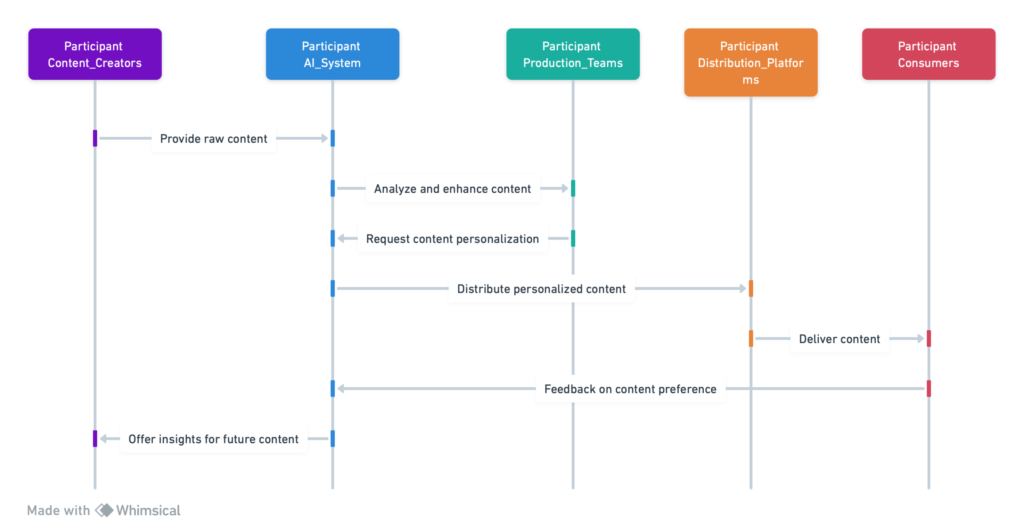
Innovations such as virtual production and real-time visual effects powered by AI in entertainment are reshaping the filmmaking landscape.
Virtual production, exemplified by technologies like LED volume stages, uses AI to blend real-time CGI backgrounds with live-action footage, allowing directors and cinematographers to see their scenes come to life instantly.
This integration of AI in entertainment enhances creative flexibility and reduces post-production work, enabling more dynamic storytelling.
AI’s application in movie and TV production is significantly altering traditional paradigms of content creation.
From the initial stages of scriptwriting and casting to the complexities of production and post-production, AI provides tools that enhance creativity, efficiency, and personalization.
These advancements benefit creators and producers and promise richer and more engaging viewing experiences for audiences.
As AI in entertainment evolves, their role in movie and TV production is set to deepen, heralding a new era of innovation and creativity in the entertainment industry.
3. AI in Music and Audio Production
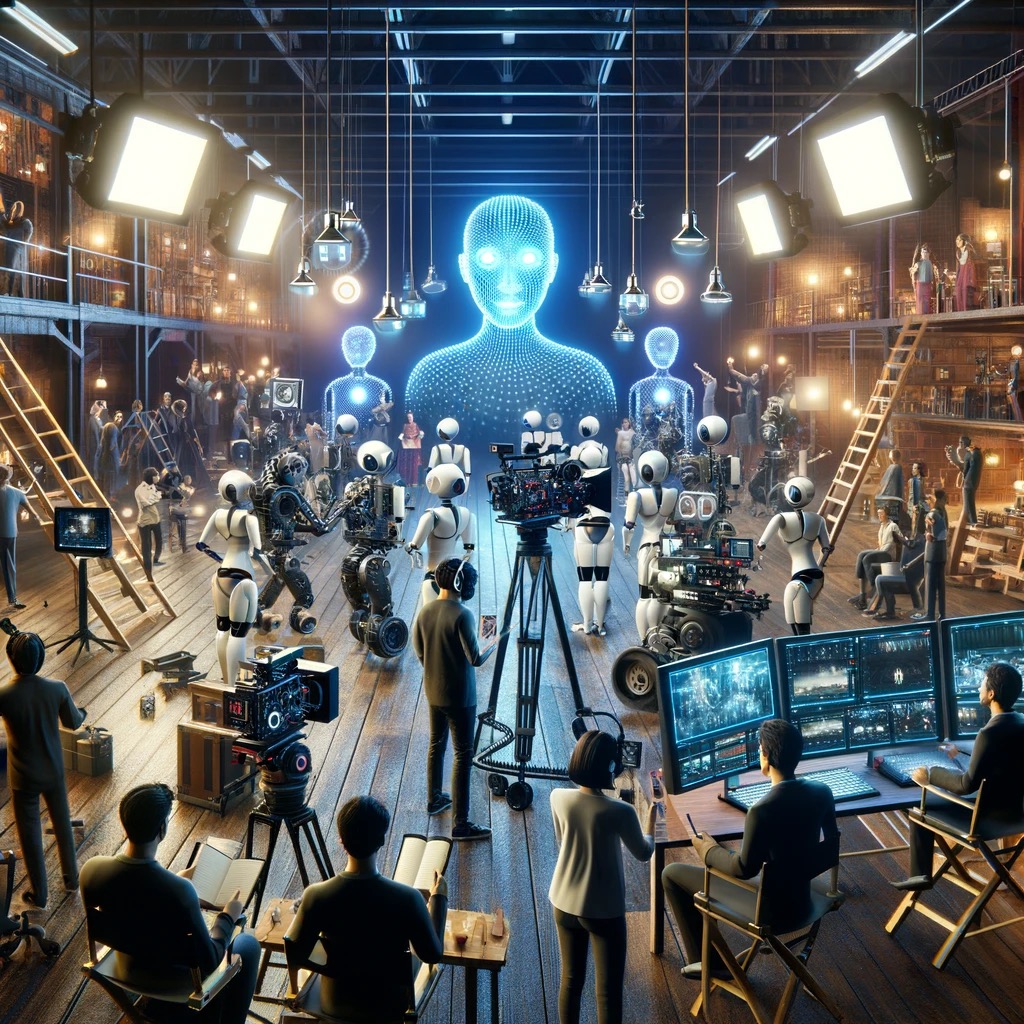
AI in entertainment is transforming the music and audio production landscape, from composition and sound design to distribution and personalized recommendations.
AI’s role in these processes is multifaceted, offering previously unimaginable tools for creativity, efficiency, and personalization.
AI’s Role in Music Composition and Production
AI in entertainment have opened up new horizons in music composition and production, enabling artists to harness machine-learning algorithms for creative expression and technical refinement.
- Music Composition: AI systems can now compose music in various styles, from classical to contemporary genres. These systems analyze vast amounts of musical data to understand patterns, structures, and styles, creating original compositions that can stand on their own or inspire human musicians. AI composers like AIVA (Artificial Intelligence Virtual Artist) have even released albums composed entirely through algorithms, challenging our perceptions of creativity and authorship in music.
- Sound Design and Production: AI also revolutionizes sound design and production by automating mixing, mastering, and editing. Machine learning algorithms can optimize audio levels, balance tracks, and even apply effects to enhance the overall sound quality, significantly reducing the time and expertise required for these tasks. This democratizes music production, making high-quality sound accessible to artists at all levels.
Case Studies of AI in Music Creation and Personalization
- AI in Music Personalization: Platforms like Spotify and Apple Music use AI-driven algorithms to recommend music to listeners based on their listening habits, preferences, and moods. These personalized playlists and recommendations have transformed how listeners discover new music and artists, deeply individualizing the music experience.
- Collaborative AI Music Tools: Tools like Google’s Magenta project aim to inspire musicians by providing AI-powered instruments and studio effects that respond to and evolve with the artist’s input. These collaborations between human musicians and AI systems result in unique compositions that blend algorithmic complexity with human emotion and creativity.
Impact of AI on Music and Audio Production
The impact of AI in entertainment on music and audio production extends beyond the technical aspects, influencing the industry’s culture and economics.
By lowering barriers to entry, AI enables a more diverse range of voices to be heard, enriching the musical landscape.
However, it also raises questions about copyright, originality, and the future role of human musicians in an increasingly automated industry.
AI in entertainment integration into music and audio production represents a significant shift in how music is created, produced, and experienced.
By automating complex processes and enabling new forms of creativity, AI enhances the production workflow and opens up new possibilities for artists and audiences alike.
The future of music, shaped by AI, promises a blend of algorithmic precision and human artistry that will continue to push the boundaries of what is musically possible.
As we move forward, the challenge will be to harness these technologies in a way that respects artistic integrity and fosters genuine innovation in the ever-evolving tapestry of global music culture.
4. AI in Video Games and Interactive Media
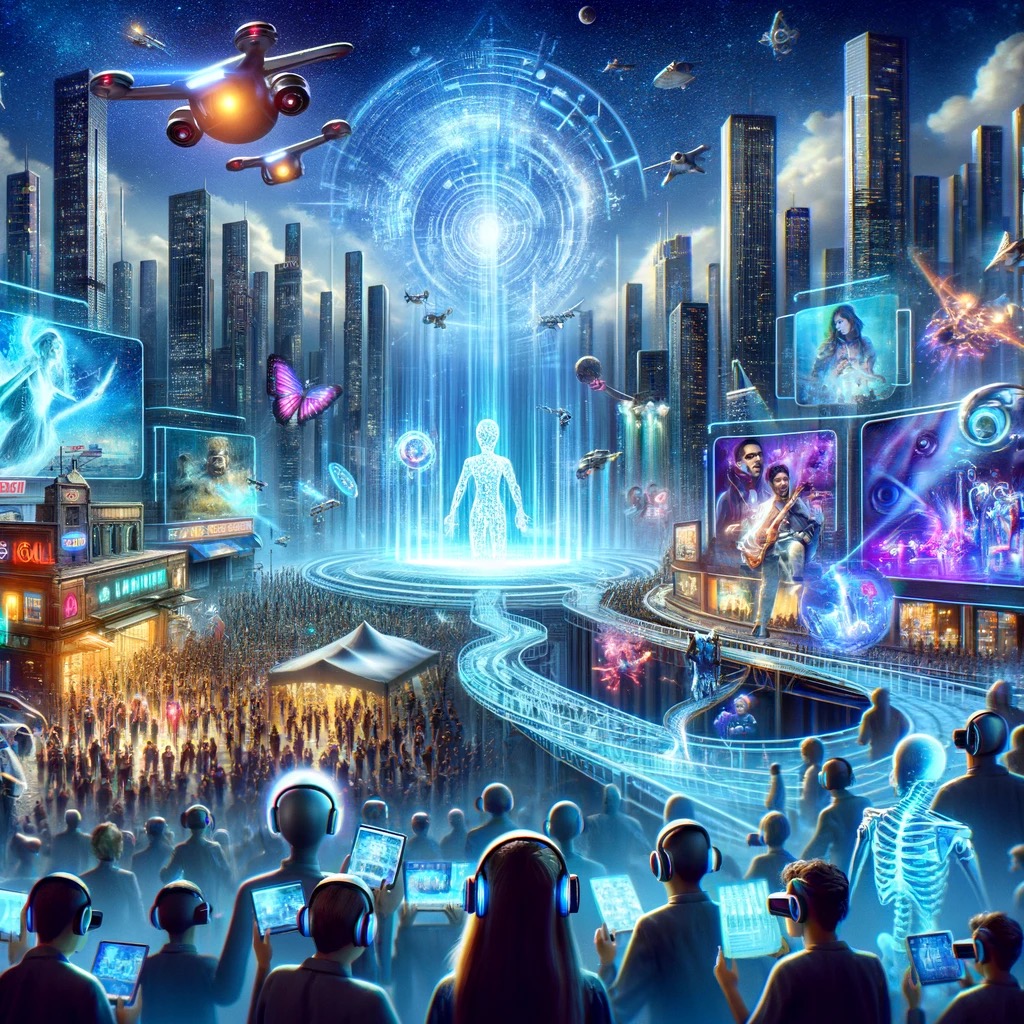
AI in entertainment is pivotal in revolutionizing video games and interactive media.
It significantly enhances the gaming experience through dynamic narratives, responsive environments, and characters that learn and adapt to the player’s actions.
Enhancing Gaming Experiences through AI-driven Narratives and Characters
AI in entertainment enables the creation of complex narratives and characters in video games, offering gamers unprecedented interactivity and immersion.
- Dynamic Storytelling: AI algorithms can generate or alter narratives in real time based on player choices, creating personalized story arcs that adapt and evolve. This dynamic storytelling ensures that no two playthroughs are the same, greatly enhancing replay value and player engagement.
- Responsive and Adaptive Characters: AI-driven NPCs (Non-Player Characters) can learn from the player’s actions, respond with a wide range of emotions, and make decisions that influence the game’s outcome. These AI characters provide deeper interaction and realism, making the game worlds more believable and engaging.
Innovations in AI for Immersive and Interactive Gaming
Integrating AI in entertainment game development has led to several innovations that push the boundaries of immersion and interactivity.
- Procedural Content Generation: AI creates vast, explorable worlds procedurally, ensuring that players encounter unique environments, challenges, and items each time they play. This extends the game’s life and adds a layer of discovery and surprise to the gaming experience.
- Real-time Learning and Adaptation: AI systems within games can analyze player behavior and preferences to adjust difficulty levels, spawn resources, or modify game mechanics in real time, maintaining an optimal balance of challenge and accessibility for players of all skill levels.
- Voice and Gesture Recognition: Advanced AI algorithms enable games to recognize and respond to voice commands and physical gestures, providing new ways for players to interact with game worlds. This technology is particularly impactful in VR (Virtual Reality) and AR (Augmented Reality) gaming, where immersion is essential.
Case Studies of AI in Gaming
- The Nemesis System in “Middle-earth: Shadow of Mordor”: This innovative AI system creates unique NPC adversaries with their personalities, memories, and relationships with the player, greatly enhancing the depth and complexity of the gaming experience.
- AI Dungeon: An AI-driven text adventure game that generates stories and responses on the fly based on player inputs. Powered by advanced natural language processing algorithms, AI Dungeon showcases the potential of AI to create endlessly engaging narrative experiences.
Challenges and Future Directions
While AI in entertainment significantly enhances video game design and play, it also presents challenges, including the need for substantial computational resources and concerns about diminishing the role of human creativity in game development.
As AI technology advances, the future of gaming looks toward even more personalized and complex interactive experiences, blurring the lines between virtual and reality.
AI’s impact on video games and interactive media is profound.
It offers players experiences that were once the realm of science fiction.
By driving narratives that adapt to player choices, creating responsive game environments, and developing characters with depth and autonomy, AI enriches the gaming experience in unparalleled ways.
As we look to the future, the continued integration of AI promises to revolutionize the field further, making virtual worlds more immersive, interactive, and engaging than ever before.
5. AI in Content Personalization and Recommendation
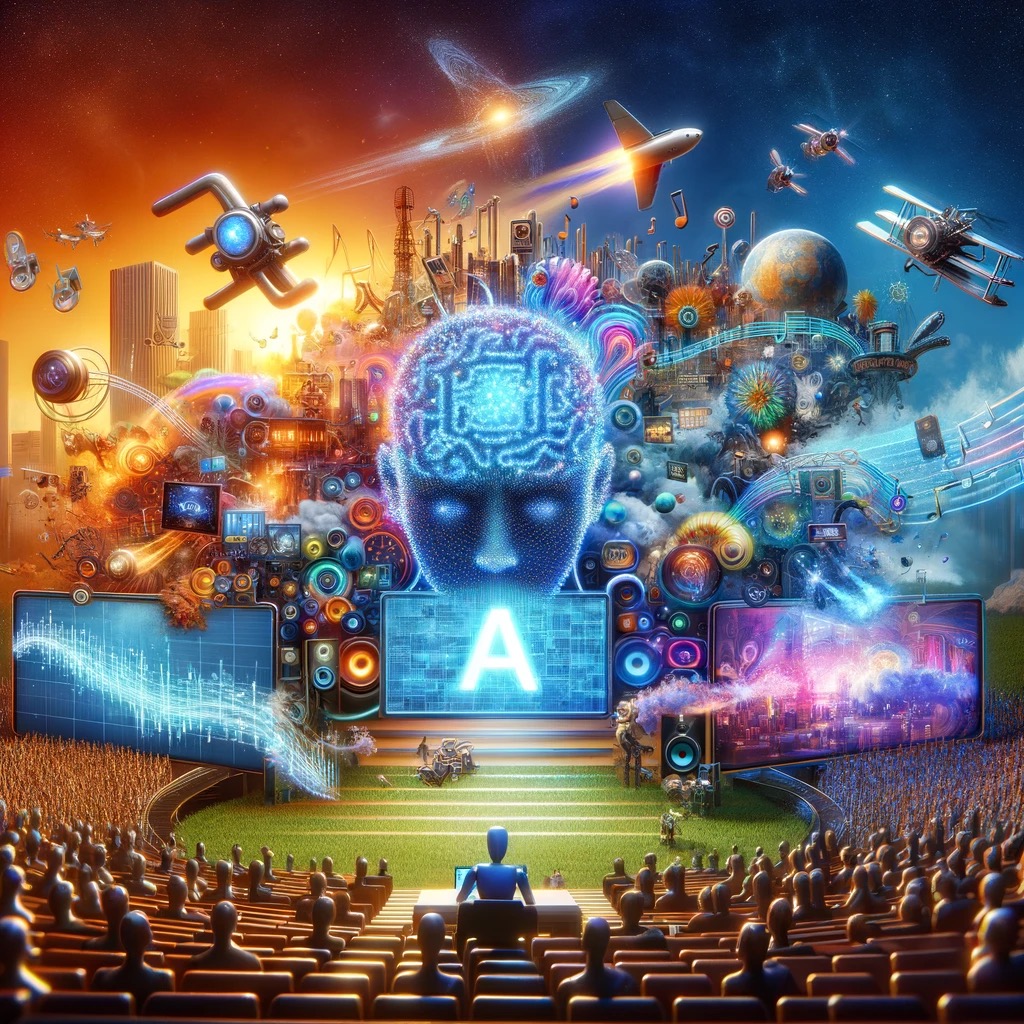
In entertainment, personalizing content and precision recommendation systems have become central to the user experience.
AI in entertainment has achieved these feats, fundamentally changing how viewers and users engage with content across platforms.
AI Algorithms for Personalized Content Recommendations
AI in entertainment recommendation systems utilize machine learning algorithms, data analytics, and user behavior analysis to curate and suggest content that aligns with individual preferences and viewing habits. These systems analyze a vast array of data points, including:
- User Interactions: Clicks, viewing history, search queries, and interaction times.
- Content Attributes: Genre, director, cast, music, and thematic elements.
- Contextual Information: Time of day, device used, and current trends.
By processing this information, AI in entertainment algorithms can predict which content a user is likely to enjoy and tailor recommendations accordingly, enhancing discovery and engagement.
Impact of AI on Viewer and User Experiences
The precision of AI-driven content recommendation systems has significantly impacted the viewer experience in several key ways:
- Enhanced Discovery: Users are exposed to a broader range of content, including movies, TV shows, music, and games they might not have found on their own. This increases content consumption and elevates lesser-known creators by connecting them with interested audiences.
- Increased Engagement: Personalized recommendations keep users engaged with platforms longer, as they’re continually presented with content that resonates with their preferences. This sustained engagement benefits platforms and creators alike, driving up viewership numbers and potentially revenue through subscriptions or ads.
- Improved User Satisfaction: By minimizing the time users spend searching for content and maximizing their enjoyment of the content they engage with, AI-driven recommendations improve overall user satisfaction. This can lead to higher retention rates and positive word-of-mouth for platforms.
Challenges in AI-driven Personalization
While the benefits are substantial, there are challenges and considerations in the deployment of AI in entertainment content personalization, including:
- Privacy Concerns: The collection and analysis of user data necessary for personalized recommendations raise questions about privacy and data security. Ensuring transparent data practices and providing users with control over their data is essential to addressing these concerns.
- Content Bubble: There’s a risk of creating a “content bubble,” where users are only exposed to what aligns with their past behavior, potentially limiting the diversity of their experiences. Balancing personalized recommendations with the discovery of new and different content is crucial.
AI’s role in content personalization and recommendation systems has transformed the entertainment landscape, offering users a highly tailored and engaging experience.
As technology advances, the potential for even more refined and intuitive recommendations grows, promising to enhance further how we discover and interact with content.
However, navigating the challenges of privacy and data security and ensuring a diverse content discovery experience will be pivotal in realizing the full benefits of AI in this space.
As we move forward, the continued innovation and responsible use of AI in content personalization and recommendation systems will play a key role in shaping the future of entertainment.
6. Challenges and Ethical Considerations
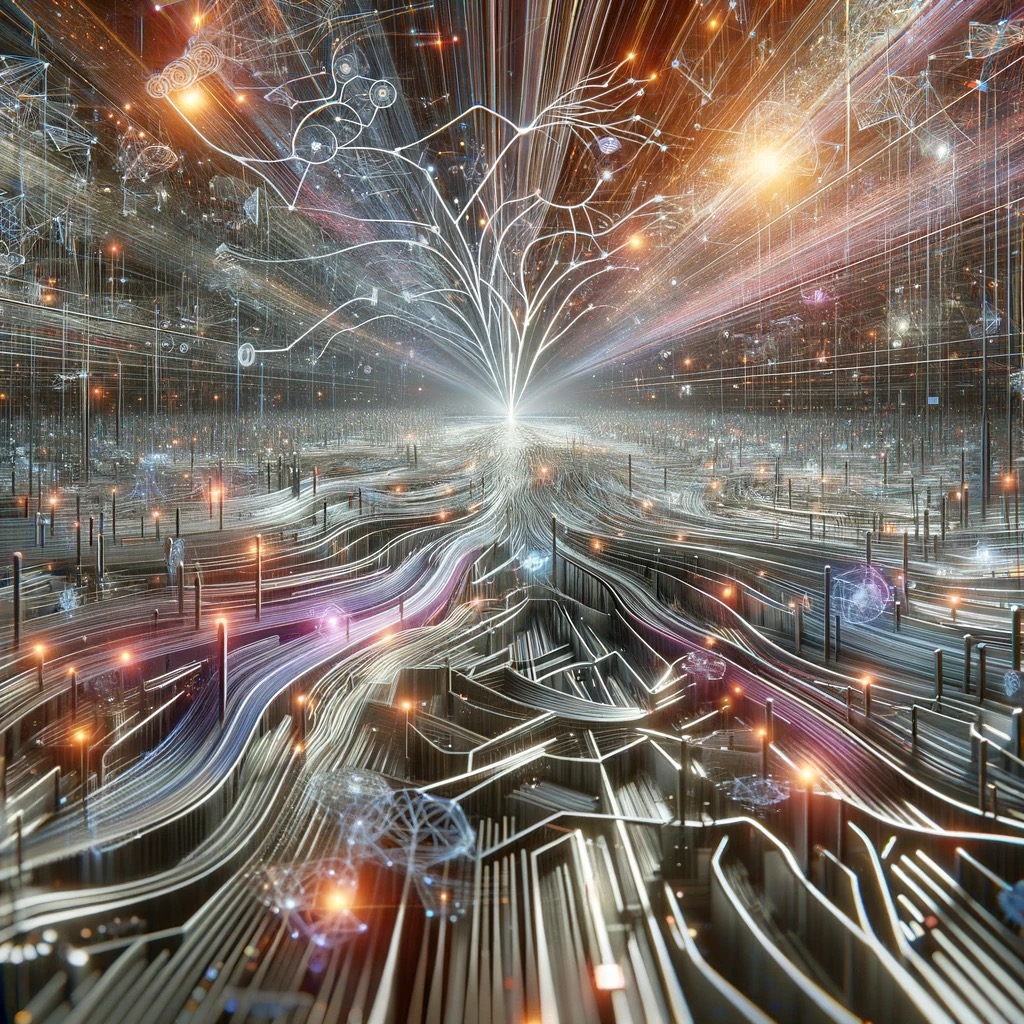
While transformative, integrating AI in Entertainment industry raises several challenges and ethical considerations.
These span creative control, copyright issues, data privacy, and the balance between AI automation and human creativity.
Addressing Issues of Creative Control and Copyright
- Creative Control: As AI plays a more significant role in content creation, questions arise about who holds creative control—the AI, its developers, or the end-users interacting with it. Determining authorship and responsibility for AI-generated content is crucial for recognizing and rewarding creative efforts.
- Copyright Issues: AI’s ability to generate content that mimics existing styles or directly incorporates elements from copyrighted works poses challenges for copyright law. Establishing clear guidelines for using and protecting AI-generated content is essential to foster innovation while respecting intellectual property rights.
Balancing AI Automation with Human Creativity
- Human vs. Machine Creativity: There’s a concern that the widespread use of AI in content creation could overshadow human creativity, reducing the value placed on human artistic expression. Finding a balance where AI enhances rather than replaces human creativity is crucial.
- Job Displacement: The automation of specific creative processes by AI could lead to displacement within industries traditionally reliant on human labor. Addressing the potential impact on employment and developing strategies to integrate AI into creative professions without undermining job security is essential.
Ensuring Data Privacy and Ethical Use of AI
- Data Privacy: AI-driven personalization and recommendation systems rely heavily on user data. Ensuring this data’s ethical collection, use, and protection is paramount to maintaining user trust and complying with global data protection regulations.
- Bias and Fairness: AI systems can inadvertently perpetuate biases in their training data, leading to unfair or skewed content recommendations. Identifying and mitigating biases in AI algorithms is necessary to ensure equitable and diverse content distribution.
Future Directions for Ethical AI Use in Entertainment
AI in entertainment industry stands at a crossroads, with AI offering immense potential and significant ethical challenges. Addressing these concerns requires a multi-faceted approach:
- Developing Ethical Frameworks: Establishing industry-wide ethical guidelines for using AI in entertainment can help address copyright issues, creative control concerns, and data privacy concerns.
- Promoting Transparency: Clear communication about how AI is used, especially in content personalization, can foster trust and informed consent among users.
- Encouraging Collaboration: Bringing together AI developers, content creators, legal experts, and ethicists to discuss and address ethical challenges can lead to more responsible and innovative uses of AI.
The challenges and ethical considerations surrounding AI in entertainment underscore the need for careful reflection and proactive management of technology’s role in creative industries.
Balancing AI’s benefits with respect for intellectual property, privacy, and the intrinsic value of human creativity is essential.
As the industry continues to evolve, fostering an environment where AI enhances rather than detracts from the creative process will be vital to unlocking its full potential responsibly and ethically.
7. The Future of AI in Entertainment
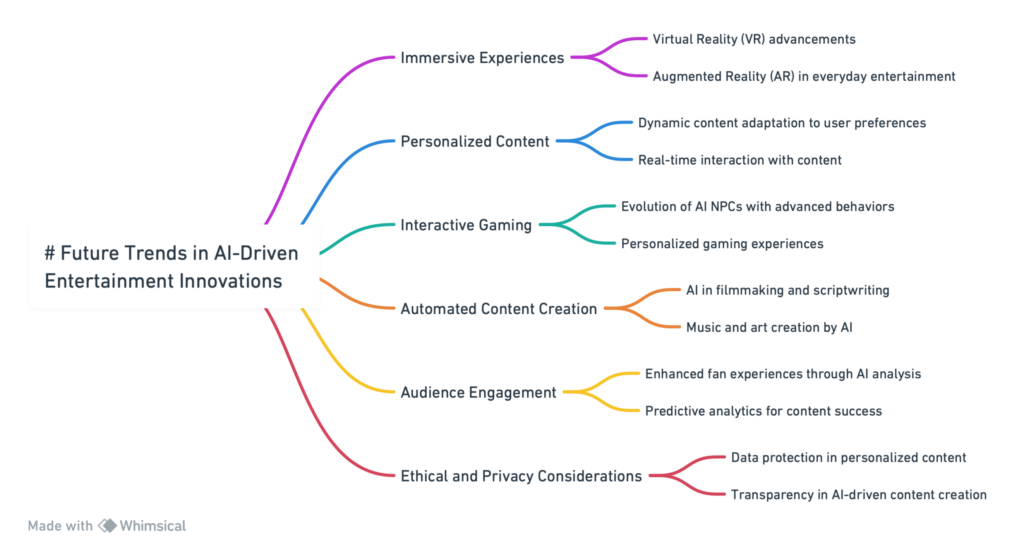
Integrating Artificial Intelligence (AI) into the entertainment industry heralds a new era of innovation, reshaping content creation, distribution, and consumption.
As we look toward the future, AI’s evolving role promises to revolutionize entertainment further, driving advancements that offer unprecedented experiences to audiences and new opportunities for creators.
Predictions for AI’s Evolving Role in Entertainment
- Enhanced Interactivity and Immersion: AI is set to redefine the boundaries of interactivity and immersion in entertainment, particularly in video games, virtual reality (VR), and augmented reality (AR). Future AI technologies will enable more sophisticated and responsive virtual environments, characters, and narratives that adapt in real time to user interactions, creating genuinely personalized and immersive experiences.
- Automated Content Creation: AI will become more prevalent in automating content creation, with algorithms generating not just music or textual content but also complex visual media like movies and video games. This could democratize content creation, allowing more individuals to produce high-quality content without extensive technical skills or budgets.
- Real-time Translation and Localization: AI-driven real-time translation and localization services will make content instantly accessible across different languages and cultures, broadening audiences for creators and enhancing global understanding and connectivity.
Emerging Trends and Future Directions
- AI in Live Entertainment: AI will significantly enhance live entertainment, from concerts to theater, by generating visuals, real-time audience interaction, and personalized experiences. This integration will open new avenues for creative expression and audience engagement.
- Ethical AI Creativity: As the industry navigates the challenges of AI-generated content, ethical considerations around AI creativity will lead to developing standards and practices that ensure fair compensation and recognition for creators, alongside the responsible use of AI tools.
- Collaborative AI-Human Creations: In the future, we will likely see more collaborations between AI and human artists. In this scenario, AI’s role shifts from creator to creative partner, offering tools and insights that complement and enhance human creativity.
Challenges and Considerations for the Future
The trajectory of AI in entertainment has its challenges. Issues such as copyright infringement, ethical concerns around deepfakes, and the potential for job displacement in traditional creative roles will require careful consideration and regulation.
Moreover, ensuring that AI enhances rather than diminishes the human element of creativity will be paramount.
The future of AI in entertainment is ripe with possibilities, promising to transform how we create, distribute, and experience content.
By harnessing the power of AI, the entertainment industry can unlock new levels of creativity, personalization, and global reach.
However, navigating the ethical and practical challenges accompanying these advancements is crucial as we venture into this new frontier.
Encouraging continuous innovation while advocating for the responsible use of AI will ensure that the future of entertainment remains vibrant, inclusive, and profoundly human.
As AI technology continues to evolve, its integration into entertainment will undoubtedly lead to further breakthroughs, reshaping the industry in ways we are only beginning to imagine.
8. Conclusion
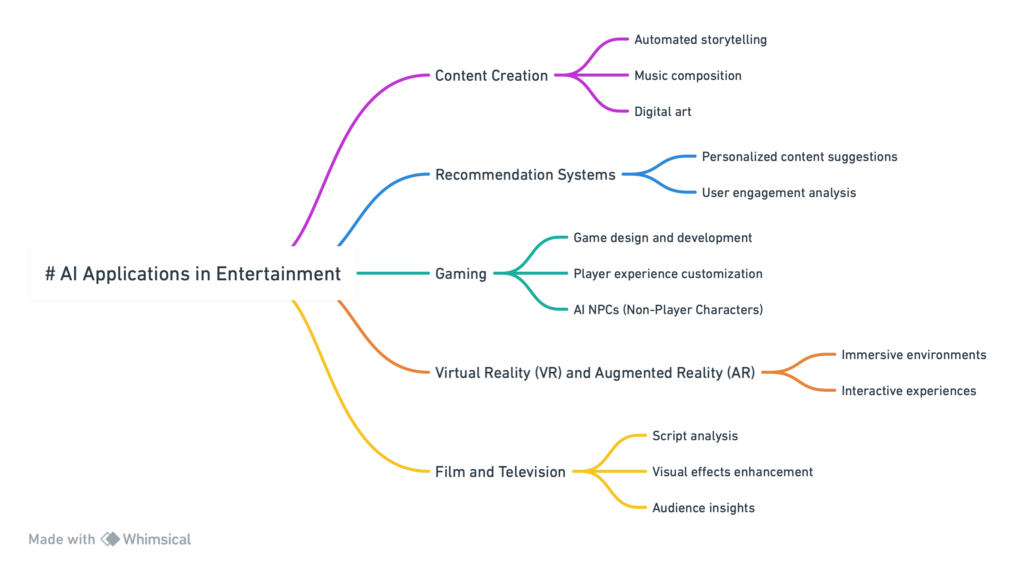
The journey through the intersection of Artificial Intelligence (AI) and the entertainment industry has unveiled the transformative impact of AI across various sectors, from movie and TV production and music and audio production to video games and interactive media, as well as content personalization and recommendation systems.
This exploration has highlighted not only the innovative applications of AI but also the challenges and ethical considerations accompanying its integration into creative processes.
AI’s influence in the entertainment industry signifies a paradigm shift towards more personalized, immersive, and interactive experiences.
Through AI-driven narratives, dynamic content creation, and tailored user experiences, the industry is poised to offer audiences novel ways to engage with content that transcends traditional boundaries.
Moreover, AI’s role in streamlining production processes and enhancing creative workflows presents unprecedented opportunities for creators, enabling more efficient and imaginative content creation.
However, as we have seen, the advancement of AI in entertainment also necessitates a careful consideration of issues such as creative control, copyright, data privacy, and the balance between automation and human creativity.
Addressing these challenges requires a collaborative effort among technologists, creators, legal experts, and ethicists to ensure that AI is used responsibly and ethically, enhancing the industry without compromising artistic integrity or individual privacy.
Looking to the future, AI in entertainment promises continued innovation and growth.
As technology evolves, so will how we create, distribute, and consume entertainment, driving the industry towards more personalized, engaging, and accessible content.
AI’s potential to further revolutionize entertainment is vast, offering a glimpse into a future where technology and creativity converge to create experiences that are more immersive and inclusive than ever before.
In conclusion, the transformative impact of AI in entertainment is undeniable, offering a wealth of opportunities for innovation and growth.
Encouraging the continuous and responsible use of AI within the industry is essential for harnessing its full potential, ensuring that the future of entertainment remains vibrant, diverse, and attuned to the evolving needs and desires of audiences worldwide.
As we move forward, the integration of AI into entertainment will continue to inspire, challenge, and redefine the industry landscape, ushering in a new era of digital creativity and storytelling.
FAQ & Answers
1. How is AI used in the entertainment industry?
AI is used in script analysis, special effects, music production, gaming, and personalized content recommendations, enhancing creativity and user experiences.
2. What are the challenges of implementing AI in entertainment?
Challenges include ensuring creative integrity, managing copyright issues, data privacy, and finding the balance between AI and human creativity.
Quizzes
Quiz 1: “AI in Entertainment” – Identify AI applications in different entertainment scenarios.
Let’s explore how AI is revolutionizing the entertainment industry through various applications. Here are several scenarios where AI technology is making a significant impact. Your task is to identify the specific AI application or technology being used in each situation:
- Movie Recommendation Systems: A popular streaming service uses an algorithm to suggest movies and TV shows to its users based on their viewing history, ratings, and preferences. This system constantly learns from user interactions to improve its recommendations over time.
- Music Composition: An AI software is capable of composing original music in various styles and genres. It analyzes patterns in a vast database of songs to generate new compositions that can be used for movies, video games, or as standalone pieces.
- Video Game Development: In this scenario, AI is used to create more realistic and dynamic game environments. It generates non-player characters (NPCs) with behaviors that adapt to the player’s actions, making the game more immersive and challenging.
- Virtual Reality Experiences: An entertainment company employs AI to enhance virtual reality (VR) experiences, making them more interactive and personalized. The AI adjusts the storyline and challenges based on the user’s preferences and actions within the VR environment.
- Content Creation for Social Media: An AI tool assists influencers and content creators by generating ideas, writing scripts, and even editing videos based on trends and the creator’s style. This tool helps creators produce content more efficiently and stay relevant to their audience.
- Automated Video Editing: This AI application automatically edits footage by selecting the best shots, adjusting the lighting and color, and even adding music that fits the mood of the video. It’s used by filmmakers and video content creators to streamline the post-production process.
Identify the AI applications or technologies used in each of these entertainment scenarios.
Here are the AI applications or technologies being used in the described entertainment scenarios:
- Movie Recommendation Systems: The technology is AI-powered Recommendation Engines. These systems use machine learning algorithms to analyze users’ viewing habits, preferences, and interactions to personalize content recommendations, enhancing the user experience on streaming platforms.
- Music Composition: This scenario employs AI in Music Generation. The software uses algorithms to analyze patterns in a vast corpus of music, learning from various genres and styles to create original compositions. This technology is used for producing background scores for movies, games, and even creating new songs.
- Video Game Development: The application is AI-driven Dynamic Game Design. AI is used to develop adaptive and intelligent non-player characters (NPCs) and game environments that respond to the player’s actions. This creates more engaging and immersive gaming experiences by making game behavior more unpredictable and realistic.
- Virtual Reality Experiences: This uses AI for Enhanced VR Interactivity. AI algorithms adjust the VR experience in real-time based on the user’s actions and preferences, personalizing the storyline and challenges to increase engagement and immersion in the virtual world.
- Content Creation for Social Media: The technology is AI-driven Content Assistance. This AI tool supports social media influencers and content creators by generating content ideas, writing scripts, and editing videos, tailored to current trends and the creator’s unique style. It streamlines content production and helps maintain audience engagement.
- Automated Video Editing: This scenario involves AI in Automated Video Editing. The application uses machine learning to analyze footage, selecting optimal shots, and automatically performing tasks like adjusting lighting, color correction, and adding appropriate music. This technology significantly reduces the time and effort required in the video editing process, making it accessible to both professionals and amateurs.
Each of these applications demonstrates the diverse and transformative impact of AI across various facets of the entertainment industry, from personalizing user experiences to supporting content creation and enhancing interactive entertainment.
Quiz 2: “Creative AI Innovations” – A quiz on recent AI innovations in the entertainment industry.
Here are brief descriptions of cutting-edge applications and technologies. See if you can identify the specific innovation or the type of AI technology being described:
- Deepfake Technology for Dubbing: This AI innovation allows actors’ faces in movies and TV shows to be manipulated to match the lip movements of voiceovers in different languages, making the dubbing process more seamless and the final product more engaging for international audiences.
- AI-Driven Interactive Storytelling: An emerging technology that enables video games and interactive media to dynamically change storylines, environments, and character behaviors in real-time based on player decisions, creating a highly personalized and unique narrative experience for each user.
- Generative AI for Fashion in Virtual Worlds: This technology uses AI to design unique clothing and accessories for avatars in virtual reality environments and video games. It analyzes current fashion trends and generates new designs, allowing users to customize their digital personas in innovative ways.
- AI Music Video Director: An AI tool that directs music videos by analyzing the song’s mood, lyrics, and rhythm. It suggests visual themes, color schemes, and transitions, and can even generate and edit video content, offering a new tool for artists to create visually captivating music videos.
- Voice Synthesis for Podcasts: AI technology that synthesizes human-like voices for use in podcasts and audio content. It can generate voices of different ages, accents, and styles based on text input, providing content creators with a versatile tool for producing varied and engaging audio experiences.
- Emotion-Driven Music Recommendation: An AI system that recommends music based on the listener’s current emotional state. It analyzes the user’s interactions, facial expressions, or voice tone (with permission) to discern their mood and suggests songs that match or alter that mood, creating a more intuitive music listening experience.
Identify the AI innovations or technologies used in these entertainment industry scenarios.
Here are the AI innovations or technologies being described in the entertainment industry scenarios:
- Deepfake Technology for Dubbing: The innovation is AI Deepfake Technology for Lip-syncing. This technology manipulates actors’ faces in films or TV shows to match the dubbing in various languages seamlessly, enhancing the viewing experience for a global audience by making dubbed content appear more natural.
- AI-Driven Interactive Storytelling: This refers to Dynamic Narrative Engines Powered by AI. These engines alter storylines, environments, and character interactions in real-time based on player choices, providing a unique and personalized narrative experience in video games and interactive media.
- Generative AI for Fashion in Virtual Worlds: The technology is Generative AI for Virtual Fashion Design. It uses AI to create unique clothing and accessory designs for avatars in virtual environments and games, allowing users to customize their digital personas with innovative and trendy options.
- AI Music Video Director: This innovation involves AI as a Creative Director for Music Videos. By analyzing a song’s mood and lyrics, the AI suggests visual concepts and edits the video content, empowering artists to produce music videos that are visually aligned with their music.
- Voice Synthesis for Podcasts: The technology is Advanced AI Voice Synthesis. It generates human-like voices from text for podcasts and audio content, offering content creators a wide range of vocal characteristics to choose from, thereby enriching the audio experience for listeners.
- Emotion-Driven Music Recommendation: This refers to Emotion-Sensitive AI Music Recommendation Systems. By analyzing the listener’s emotional state through interactions, facial expressions, or voice tones, the system recommends music that matches or influences the listener’s mood, making for a more personalized and emotionally intelligent listening experience.
Each of these AI innovations showcases the creative potential of artificial intelligence in transforming how entertainment content is created, customized, and consumed, offering new levels of interactivity, personalization, and immersion.
